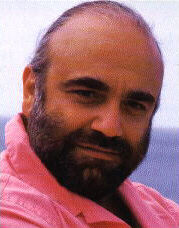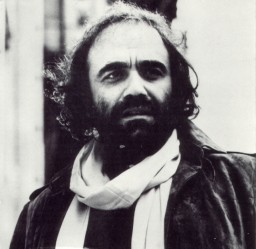About vocalist Demis Roussos, who collaborated with Vangelis in the '60s, 70's and '80s.
The saga of Demis Roussos
Artemios (Demis) Ventouris Roussos, born 15 June 1946; died 25 January 2015
Artemios (Demis) Ventouris Roussos was born in Alexandria, Egypt on June 15, 1946. His father, George, had been a successful Greek architect, but the family, including mother, Olga, and brother, Costas, was forced to flee as penniless immigrants. They left behind their possessions during the Suez crisis and returned to their native Greece.
Demis, forced to support his family, began work as a cabaret musician having learned guitar, trumpet and piano in school.
In Athens in the mid-sixties a musical style was flourishing. Many bands were performing and recording cover versions of popular European and English songs. Demis joined this scene playing bass with The Idols and We Five. Other bands of this era included The Charms, The Sounds and perhaps more importantly Vangelis Papathanassiou's band, The Forminx. In the band We Five, in addition to playing bass, Demis lent his distinctive voice to the cover songs "House of the Rising Sun", "When a Man Loves a Woman" and "Paint it Black". A singer was born!
Demis met Vangelis while performing and along with Lucas Sideras and Anargyros "Silver" Koulouris Aphrodite's Child was formed. Aphrodite's Child was a chart-topping pop and progressive rock band whose ultimate achievement "666" managed to gain the group notoriety due to not only the album's heavy concept ( the Apocalypse of John, 13:18, Book of Revelations), but more notably the vocal performance of Greek actress Irene Papas. "666" was held from release by Mercury Records for 2 years due to this controversy.

"666" would sadly signal the end of Demis' full time involvement with Aphrodite's Child and Vangelis; although any signs of acrimony were not found as the two appeared to enjoy occasional collaborations. One such collaboration between Vangelis and Demis, and one that is often overlooked, is on Vangelis' 1970 soundtrack "Sex Power", wherein Demis contributed background vocals.
As Vangelis went on to explore his personal style of electro-acoustic composition with the newly acquired synthesizers of the day, Demis continued in the style of Aphrodite's Child recording pop music with a Mediterranean flavor augmented by his distinct vocals.
Demis' first solo album was "On the Greek Side of My Mind" which was also titled "Fire and Ice" on the French release. The album featured Lucas Sideras and Silver Koulouris of Aphrodite's Child, Michel Ripoche on violin, with lyrics by Boris Bergman, another Aphrodite's Child alumni. The arrangements were by Stylianos (Lakis) Vlavianos who mixed elements of Greek folk music with progressive rock. "On the Greek Side of My Mind" was not too far off from the style of Aphrodite's Child and was thusly cited as one of Demis' most creative releases.
Following "On the Greek Side of My Mind", Demis began recording more "easy listening" music and throughout the 70's had many hit records such as "This Time it isn't Au revoir", "Happy to Be on an Island in the Sun", "My Reason" and "Goodbye My Love, Goodbye", which topped the charts at #1 in the U.K. Many of these songs were composed and arranged by Lakis Vlavianos and/or Harris Chalkitis.
Despite being labeled as "Middle of the Road" (something Demis had no problem admitting), Demis' music of the mid to late 70's was not without its diamonds in the rough. 1976's "Happy to Be …" provided some hidden treasures such as "Mary Was an Only Child", "Funny Man" and "Lovely Love De Paris", which was written and arranged by the French composer Francis Lai ("Bilitis", "Love Story") with his arranger Jean Musy ("Chanel Solitaire").
1977 saw Demis and Vangelis teaming up for the "Magic" album, on which there were some inspired moments. The arrangement of "My Face in the Rain" (an earlier track of Vangelis' from his album "Earth") had a gospel approach. The version of "I Dig You" was pure disco, though with an undeniable edge. "I Dig You" was an interesting track in that it first appeared on Vangelis' solo album "Earth" and was later covered with Vangelis' participation by the Italian pop duo Chrisma. Available only on vinyl for many years, "Magic" was released on CD in 1998 by BR Music. Two new Vangelis/Constandinos tunes from the original sessions were released: "The Promise" and "Song for You". Complementing the release was "Reasons Unknown (When You're Gone") which was a tear-jerker if ever there were one!

1979 saw the release of "Universum", remarkable in that it was recorded and released in four languages (French, German, Italian and Spanish).
Demis made an at-the-time uncredited appearance on Vangelis' "Blade Runner" soundtrack, offering up ethereal Arabic-inspired vocals on "Tales from the Future". Demis provided other vocals throughout the movie, most notably during the scene at Taffy Lewis' bar when Deckard (Harrison Ford) is tracking down the replicant Zhora (Joanna Cassidy). This Arabic-inspired cue was never released by Vangelis on any of his two official "Blade Runner" soundtrack releases.
In 1982 Demis with the help of photographer Veronique Skawinska published "A Question of Weight", chronicling Demis' seemingly miraculous 1980 transformation from 320 lbs. to a more manageable 220 lbs. Biographical by nature and full of anecdotes, "A Question of Weight" not only offered sensible advice for those wanting to lose weight, but provided much insight in to Demis, the musician.
Vangelis and Demis teamed up again in 1982 for the album "Demis". A highlight was "Race to the End"; a vocal adaptation of Vangelis' "Chariots of Fire" arranged and performed by Vangelis with lyrics by Jon Anderson. Two additional Jon Anderson-penned songs were on the album: "Lament" and "Song for the Free". Though Vangelis was uncredited at the time, it was later revealed that Vangelis had arranged and performed on these tracks. Other Vangelis-like synthesizer sounds on the remaining songs on "Demis" sparked debate that Vangelis had actually contributed to the entire album, but that was never substantiated.
Demis followed up "Demis" with 1982's "Attitudes", a synthesizer album with arrangements by Rainer Pietsch and keyboards by Kristian Schultz. An epic rendition of "House of the Rising Sun" brought Demis back full circle to his Greek cabaret roots.
1984 found Vangelis and Demis teaming up once again for "Reflections", an entire album of cover songs from the two Greek friends' past. To make the reunion more complete, Silver Koulouris was featured playing guitar. "Marie Jolie" by Aphrodite's Child was covered alongside classic American pop standards like "Love Me Tender" and "Stand by Me". All of these songs were given the Vangelis treatment with heavy use of drums and bass and surprisingly, were performed in a reggae style!

On July 14, 1985, Demis and his girlfriend Pamela took TWA Flight 847 from Athens to Rome. Their plane was hijacked shortly after take-off by members of Hezbollah and Islamic Jihad who were seeking the release of 700 Shi'ite Muslims from Israeli custody. Demis and Pamela were kept hostage on the plane in Beirut for five days. Although the English press at the time praised Demis for "singing his way to freedom" (the hijackers did indeed recognize Demis and let him off the plane many days before the other passengers) it was quite evident that the incident had left Demis shaken and a new lease on life was forged.
In 1987 Demis made his comeback with "The Story of Demis Roussos", in which he re-recorded several Aphrodite's Child and solo tracks utilizing the digital technology of the day. His new versions of "I Want to Live" and "Break" were particularly poignant with Demis breathing new life into the lyrics. There were several new songs, including "Island of Love" which became a popular hit.
The late eighties saw Demis release in quick succession "La Grec" (1988, arranged by renowned French musician and engineer Bernard Estardy), "Time" (1988) and "Voice and Vision" (1989). Demis sang French, English and Italian and the instrumentation was mostly electronic. Demis, having lost much of his once hefty 300 lbs. girth, was singing with a range that had not diminished with the rigors of a 25-plus year career. "Time" was met with a favorable reception. Standout tracks were "I Won't Give Up" and "Let the Bells Ring".
Not one to be lacking in Christmas spirit, Demis recorded two Christmas albums: "Come All Ye Faithful" in 1987 and "Christmas with Demis Roussos" in 1992.

The nineties found Demis entering a renaissance. 1993's "Insight" was produced in France and featured a techno version of the popular traditional/Cat Stevens tune "Morning Has Broken". The Vangelis-connection was made clear by the inclusion of "Spleen", a rap tune arranged by Vangelis' ex-engineer Raphael Preston with guest vocals by the former Vangelis collaborator, Ronny. "Spleen" was, in fact, the title of a poem written by Charles Baudelaire and was recited by Demis. The poem can be found in the compilation "Les Fleurs Du Mal".
1995 saw two albums: "In Holland", a symphonic pop album of popular Dutch songs and "Immortel". "Immortel" was a fusion of synthesizer landscapes and popular French "chansons" written by the likes of Trenet, Legrand and Prevert produced and arranged by the BR Music team of Ed Starink and Bert van Breda. The album featured dynamic flute and shakuhachi playing by Peter Weekers. "Immortel" seemed to be Demis' 1990's version of "Attitudes" - his most original release of the decade. Demis followed up with another original release "Serenade" (1996), a collection of Western classical opera pieces again featuring the considerable programming and keyboard talents of Ed Starink.
Demis broke away from the BR Music collective in 1997 and returned to his Mediterranean roots with "Mon Ile" ("My Island"). "Mon Ile" was a bold mixture of several international and ethnic styles and influences with driving percussion. "Dinata", "Les Sables Auriferes" and "Ohe" were standouts.
Demis did not release any new recordings until 2000, but his star remained bright thanks to the continued efforts of BR Music. BR Music, in addition to being the producers of the bulk of Demis' 1990's recordings, led the vanguard in re-releasing and re-packaging Demis' material. "Souvenirs", "Happy to Be...", "Man of the World", "Forever and Ever", and "Attitudes", among others, all enjoyed the BR Music treatment. This meant faithful reproductions of the original album art, informational liner notes and rare bonus tracks.
BR Music's efforts culminated with the release in 1998 of "The Phenomenon", an exhaustive four CD box set spanning 30 years of Demis' music. Boasting an impressive 25 x 14 cm size with comprehensive text, "The Phenomenon" merged Demis' popular Polygram years with his 1980's and 1990's material. The fourth CD was live, rare and B-sides. Highlights were "Thousand Years of Wondering", a live 13 minute progressive rock opus, "Ulysses", an unreleased mini-rock opera from the "Forever and Ever" sessions and "Winter in America", wherein Demis confessed to waking up to strangers!

The new Millennium saw the release of a DVD companion to "The Phenomenon". Produced by BR Music and containing 20 videos, a photo gallery, discography, and an interview, the DVD gave fans a rare glimpse into Demis' world. Not to be outdone, BR Music released another DVD "Demis Roussos Greatest Hits" in 2003 that had 30 video clips and more impressively rare footage of Aphrodite's Child live in 1969.
Getting back to work in 2000 Demis put together an album, "Auf Meinen Wegen", which was a combination of new songs and re-workings of his older classics. Recorded in Germany in late '98 "Auf Meinen Wegen" was targeted to Demis' German audience. Demis sang in German, English and Italian accompanied by a full band with minimal keyboard programming. "Fiesta Fiesta Brazil" had a Latin groove and "Cinderella" and "Hello" were catchy reggae tunes.
While 2001 did not see any new recordings, Demis continued to perform. One special performance was an appearance in Lebanon at Mediterraneo 2001, the Byblos International Festival. On August 30th thru September 1st Demis performed an "avant-premiere" accompanied by the Oriental Roots Orchestra (traditional Oriental instrumentation with qanun, nai, accordion, mizmar, oriental violin, riq, mazhar, durbake and the like). Demis' classic hits were performed in an Oriental style and new songs were composed by arranger Michel Elefteriades. Mention was made that Demis and Elefteriades had collaborated on a forthcoming album which was to include "The Beast", a tune on the concert's set list.
Also in 2001, Demis visited Moscow for a large solo performance accompanied by an orchestra at Kremlin Palace. Two years later he would attend another huge show in Russia. This was "The Melodies and Rhythms of Foreign Music" with Demis performing alongside other well-known singers of the mid 80's. The songs Demis performed were "Goodbye My Love Goodbye" (a special Christmas-themed video clip was produced) and "From Souvenirs to Souvenirs". Demis was also spotted playing synthesizer on stage during another performance.
2004 saw Demis put up his official website at www.demisroussos.net, which was unfortunately taken down several years later. On the site Demis celebrated his "40 years of success" with "videos, pictures and extracts of his international career".

In 2009, Demis released a CD of entirely new recordings simply entitled "Demis". "Demis" was produced by Marc di Domenico and recorded at the State of the Ark Studios, a boutique studio in London which specialized in retro and vintage recording equipment and gear. Demis was clearly taking a few steps back and drawing inspiration from his musical beginnings and the then-current English soul revival. The songs were of a blues-y and soulful nature with a small rock band (Virgil Howe, the son of Yes' Steve Howe, played drums) and simple backup vocals. The first single was "Love Is", a jaunty 60's-inspired piece with a catchy chorus. However, the track that stood out was "Who Gives a Fuck", which in interviews Demis explained reflected the attitude of the world leaders at the time. He also commented that it was a shame that the political leaders were not like artists and musician and that artists and musicians do not make war. A huge amount of promotion and media content related to "Demis" was posted on the internet. Additionally, the tracks were made available for download.
In 2010 Demis' daughter Emily produced a documentary, "My Father, Demis", of which promo clips appeared on Youtube.
In the ensuing years after the well-received "Demis", Demis continued to tour, performing in such far-reaching places as Tel Aviv, Bucharest, Beirut, Moscow, Tunisia and South Africa. However in 2012, several concert dates in Canada and the US were canceled due to "sudden health issues".
Unfortunately, a chapter closed in the saga of Demis Roussos with the sad news that Demis had passed away the morning of Sunday, January 25, 2015. The Hygeia Hospital in Athens reported the passing as from an "undisclosed illness", though Demis' daughter, Emily, later confirmed to the French press that he had passed away from cancer of the stomach, pancreas and liver.
The Demis Roussos family posted this statement on Demis' Facebook page:
On Behalf of Demis' family we would like to express our sincerest gratitude for the overwhelming outpour of support and condolence in this difficult time. Your thoughts and prayers have not gone unnoticed, fallen on deaf ears, or overlooked by distracted glances. The dedication which you his fans have given him throughout his long and successful career had always moved Demis deeply, and the continuation of this earnest love from all of you makes the pain of our loss a little more bearable.
Thank you all,
The Roussos family.

Upon reflection those who loved Demis Roussos couldn't help but feel touched by the generosity and good nature that he generated. And though many of his fans had never met him, nor had direct contact with him, they felt that through his talent and energy that they knew him personally and that he was a friend. Many listeners travelled with Demis through his music: his early adventures with Aphrodite's Child, his soaring success in the 70's, his impressive weight loss, his recordings in Holland with BR Music, his collaborations with Vangelis, right up to his final recording, "Demis", which was a return to the American blues and soul music that had inspired him to play music at an early age. This final recording seemed appropriate upon reflection. His music had come full circle, though many of his admirers wished that Demis had many more circles to run and hills to climb. Vangelis' statement upon Demis' passing seemed to touch upon a lot of what Demis' fans were feeling at the time of his passing and it seems appropriate to end this chapter of the saga of Demis Roussos with Vangelis' words:
Demis my friend,
I have just arrived in London and I've been told that you decide to take the long voyage. I'm shocked because I can't believe that this happened so soon. Nature gave you this magic voice of yours which made millions of people around the world very happy. As for me, I keep those special memories that we share together those early days and I wish you to be happy whenever you are.
Goodbye my friend goodbye
You can also read a text on Demis from an LP.
Outside links:
1. For more information about Demis Roussos and Aphrodite's Child visit the excellent Demis Roussos / Aphrodite's Child fanclub by Paolo Cadeddu at http://digilander.iol.it/falcoclub.
2. BR-music two, the Dutch record label that produces the best reissues compilations and collectors items of Roussos' music, as well as some recent albums, has a website at www.brmusic.nl, and they sell on-line as well. All releases are of superior quality with foto's lineair notes, bonus tracks, etc.
3. A French fan site presented in several languages can be found at www.demislegrec.com

